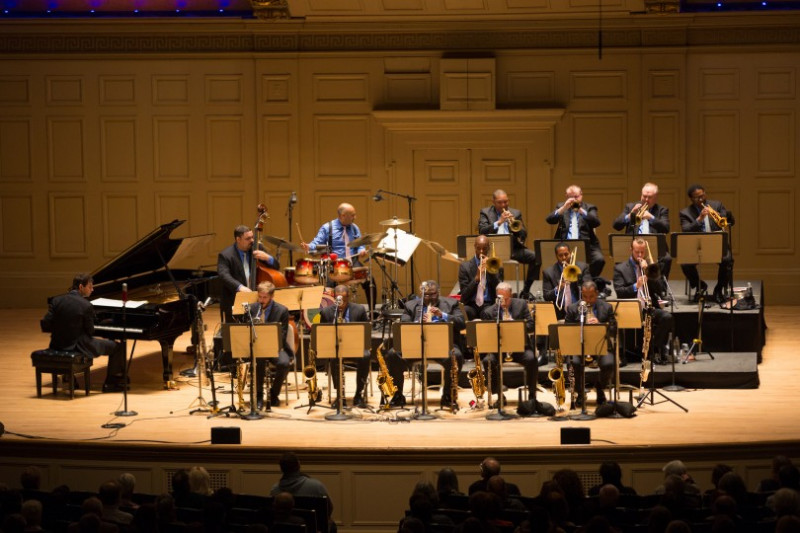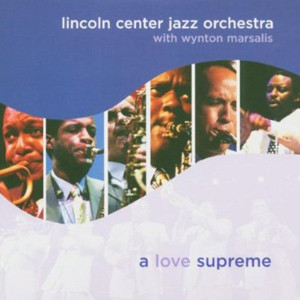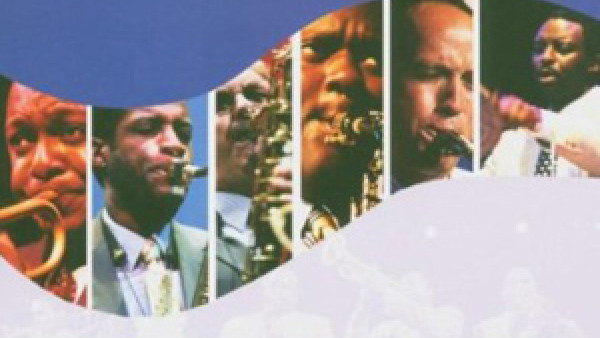Orchestra Pays Tribute to John Coltrane at Symphony Hall

Jazz at Lincoln Center Orchestra with Wynton Marsalis, presented by the Celebrity Series of Boston at Symphony Hall. Photo: Robert Torres
John Coltrane’s seminal album-long suite A Love Supreme is one of the saxophone virtuoso’s most fitting work for tribute, but also perhaps his most difficult to interpret. The jazz classic, which celebrated its 50th anniversary earlier this year, is defined by its intense, passionate and, at times, chaotic improvisation.
This made it all the more exciting to see how trumpeter Wynton Marsalis and the Jazz at Lincoln Center Orchestra would adapt the suite to the setting of a big band in their concert at Symphony Hall Sunday night, presented by the Celebrity Series of Boston. The venerable group is no stranger to ambitions compositions, including its recent productions of bandleader Wynton Marsalis’ Swing Symphony, but this piece presents a unique challenge — that of translating the work of a loose, nimble quartet at the height of their improvisational powers to the highly structured setting of a 15-piece jazz orchestra.
Jazz at Lincoln Center Orchestra with Wynton Marsalis, presented by the Celebrity Series of Boston at Symphony Hall. Photo: Robert Torres[/caption]
Before breaking out A Love Supreme, however, the group opened the concert with three notable compositions from other periods in Coltrane’s career. Africa, from the album Africa/Brass, and Olé, from Olé Coltrane, presented the group with a fine opportunity to explore the polyphonic possibilities of a big band with two pieces marked by Coltrane’s experiments with world music. Olé, a fusion of a modal jazz vamp with the rhythms and structure of Spanish folk music, was particularly impressive. It built from a lighter, ballad-like start to an intense crescendo featuring impassioned solos from bassist Carlos Henriquez and drummer Ali Jackson.
“My Favorite Things,” easily Coltrane’s most popular song, was the evening’s one disappointment. The 1960 original, a nearly 14-minute take on the Rodgers and Hammerstein song from The Sound of Music, was extremely influential, both for its introduction of the soprano saxophone in a serious jazz setting and as a demonstration of just how “out-there” a jazz musician could take a relatively simple pop song. However, in its big-band arrangement by JLO saxophonist Ted Nash, the song lost some of the angular spontaneity that originally made it such a revelation, with the traditional big band brass-hits recalling its show-tune roots to a distracting degree.
After a short intermission, the group took the stage to perform A Love Supreme. Marsalis’ arrangement remains faithful to the underlying spirit of Coltrane’s work, which was inspired by his religious revelation after emerging from a long period of drug and alcohol addiction, while vastly expanding its sonic palate. The presence of multiple horns allowed the group to add an impressive degree of complexity to the suite over its first three parts, titled Acknowledgement, Resolution and Pursuance, which barely ever abandoned a fast, almost breakneck tempo.
In this constantly shifting setting, the group added shades of swing, New Orleans brass-band music, and even contemporary classical polyphony into the album’s original mix of old gospel spirituals, Indian classical and avant-garde.
Most moving, however, was the piece’s final part, the aptly titled Psalm, a slow dirge-like tune that stands in stark contrast to the fast-paced pieces that precede it. In the original, Coltrane delivered a passionate solo following the structure, syllable by syllable, of a devotional poem printed in the inside of the album jacket. In Marsalis’ arrangement, the group largely sticks to the structure and phrasing of Coltrane’s solo but divides it up among the individual players, each providing their own take on the master’s original notes.
The piece as whole was transformed in a similar way. What was once the emotionally naked expression of one man celebrating the forces that helped him emerge from a period of utter darkness became an ecstatic group prayer, a tribute both to Coltrane’s classic music and the spiritual awakening that inspired it.
By Jonathan Gang
Source: Boston University News Service


